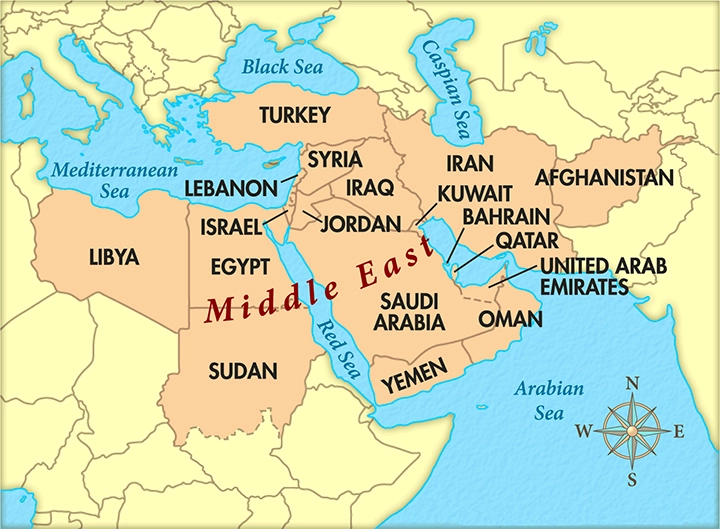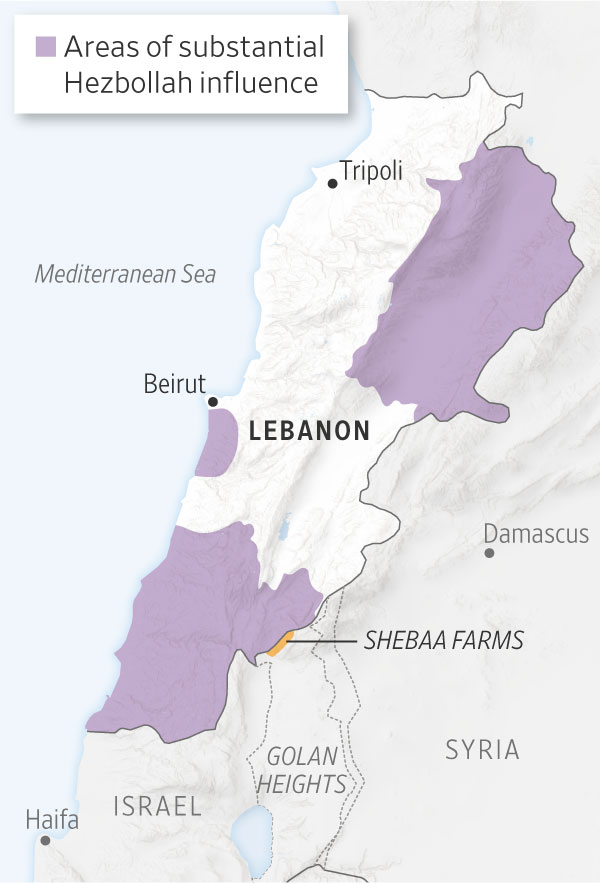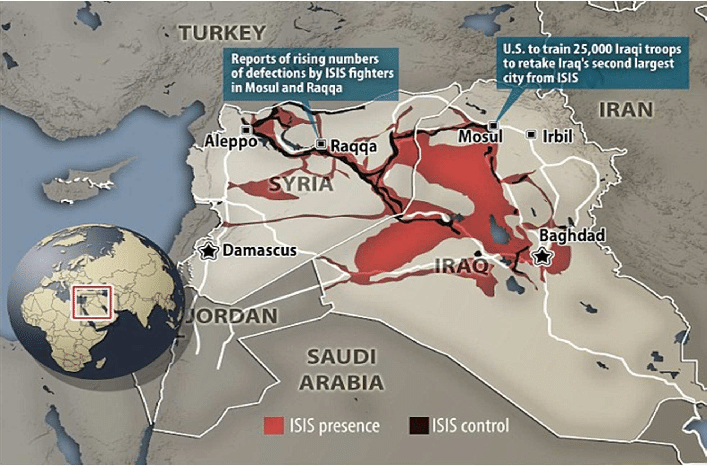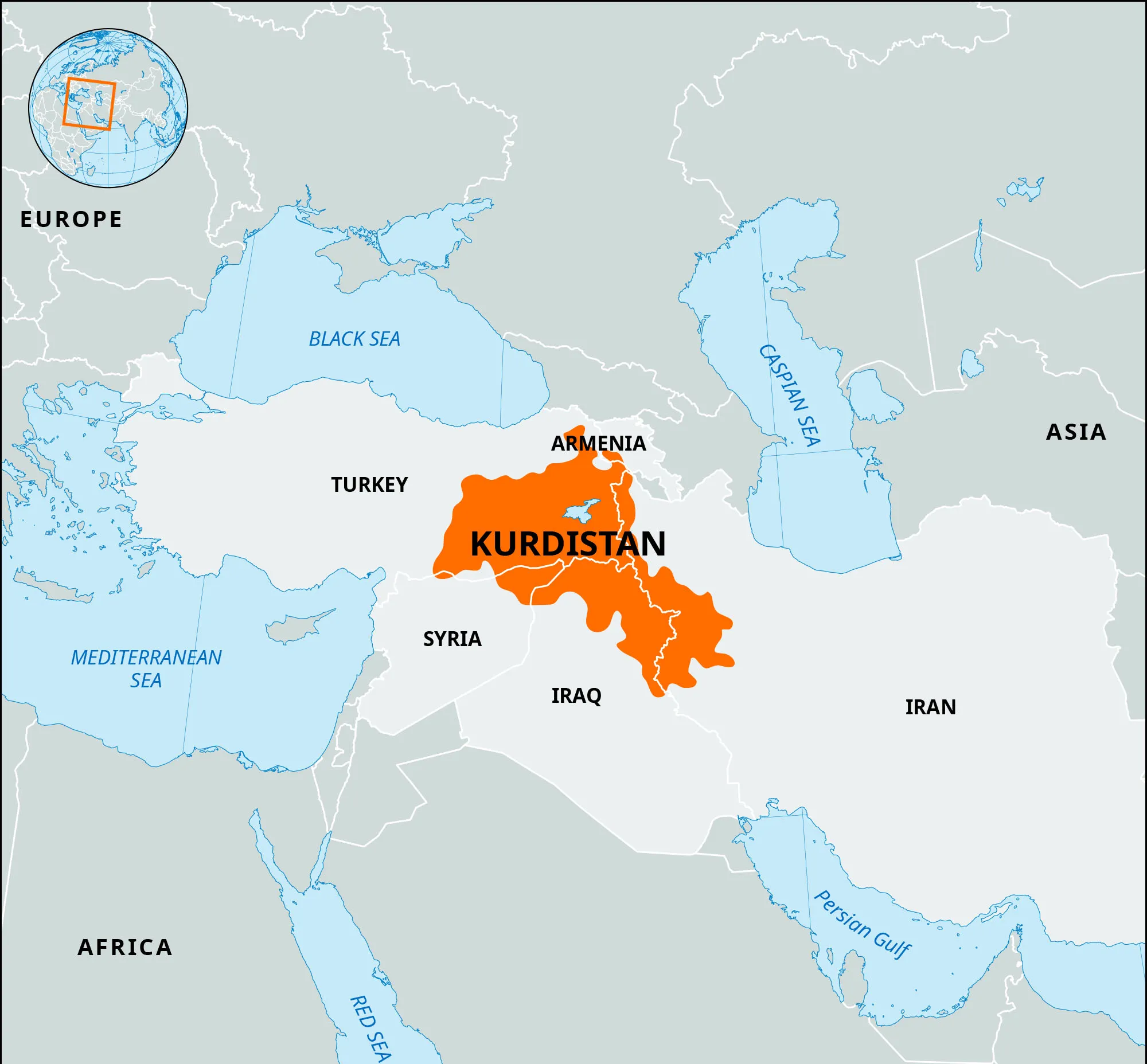International Relations
Terror Groups in the Middle East
- 15 Oct 2024
- 11 min read
For Prelims: Hezbollah, Middle east, Iran-Iraq War, Islamic State of Iraq and the Levant (ISIL), Kurds.
For Mains: Militant groups in the Middle East, India’s stand on these groups, India’s foreign policy towards key Middle Eastern countries.
Why in News?
Recently, Israel attacked the Hezbollah which is one of the militant groups fighting in the middle east. This attack brought several militant groups of the middle east into limelight.
What are the Various Terror Groups of the Middle East?
- Hizbollah
- About:
- It is a Shiite Muslim political party and militant organisation located in Lebanon, known for operating as “a state within a state.” Its paramilitary wing, the Jihad Council, commands the most powerful armed force in Lebanon.
- Hizballah’s Islamic Jihad Organization (IJO), also referred to as the External Security Organization or Unit 910, is a highly compartmentalised unit responsible for conducting overseas terrorism operations, particularly against Western targets.
- Hizballah identifies Israel and the United States as its primary adversaries and has been involved in operational activities within its homeland.
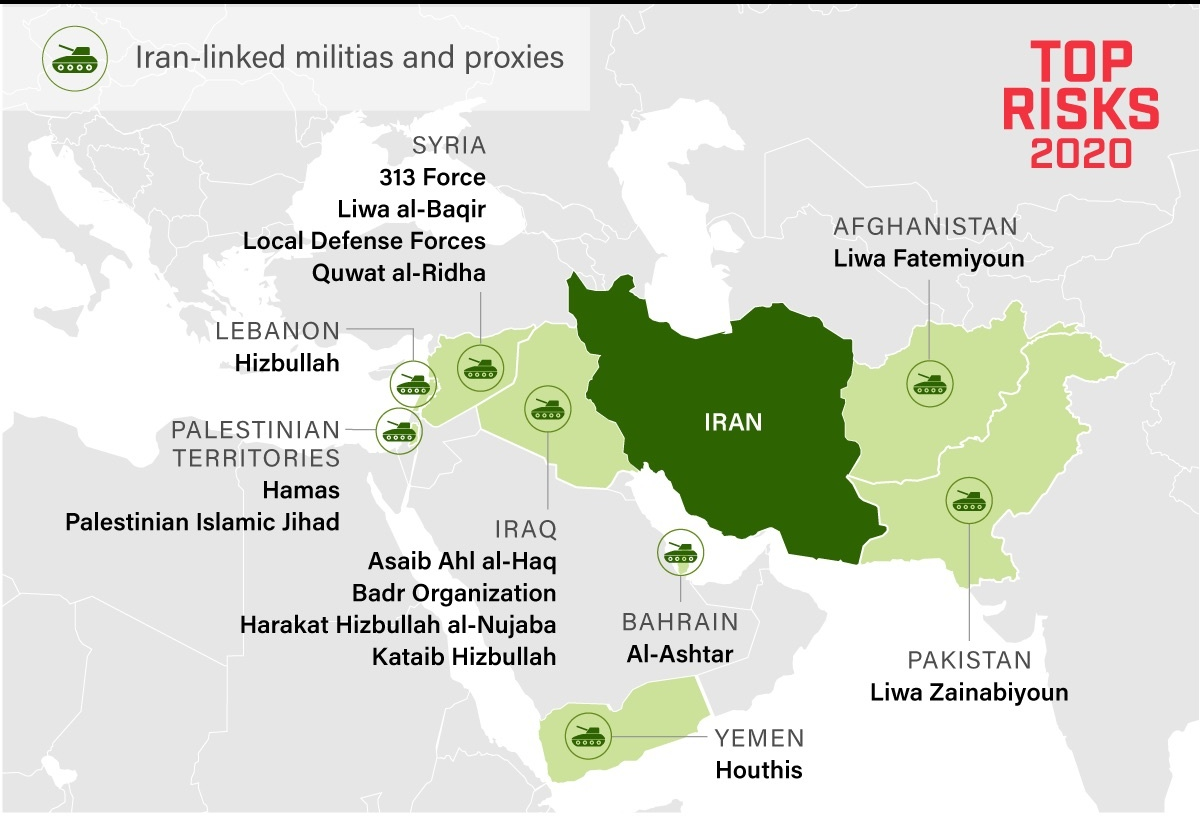
- Aim:
- Hizballah possesses state-like military capabilities, including air defense systems, missiles, precision-guided missiles, rockets, and unmanned aircraft systems.
- The group is dedicated to maintaining its strategic partnership with Iran, supporting the Syrian regime, and consolidating its power within Lebanon while opposing Israeli interests and striving to expel US forces from the Middle East.
- Since its inception it aimed to eliminate the state of Israel.
- Territory of Influence:
- United Nations Stand:
- The UN considers Hezbollah a terrorist organisation and a major threat due to its military capabilities and involvement in both regional conflicts and global terrorism.
- About:
- Badr Organization
- About:
- It is an Iraqi Shia Islamist and Khomeinist political party and paramilitary group.
- Originally known as the Badr Brigades or Badr Corps, the organization was formed in 1982 as the military wing of the Supreme Council for Islamic Revolution in Iraq (SCIRI), a Shia Islamic party based in Iran.
- Aim:
- The Badr Brigade was established with the support of Iranian intelligence and Shia cleric Mohammad Baqir al-Hakim, with the primary objective of opposing Saddam Hussein's Ba'athist regime during the Iran-Iraq War.
- After the 2003 US-led invasion of Iraq, a large portion of Badr Brigade fighters joined the Iraqi army and police forces, becoming an integral part of Iraq’s security apparatus.
- The Badr Organization gained prominence again in 2014 due to its active involvement in combating the Islamic State of Iraq and the Levant (ISIL) as part of the Popular Mobilization Forces (PMF).
- Its role within Iraq’s paramilitary framework has been significant, contributing to national security, particularly through their association with the PMF, which operates under the Iraqi government’s oversight .
- Territory of Influence:
- Baghdad and Southern Iraq.
- United Nations Stand:
- The UN views the Badr Organization as destabilizing due to its Iranian links, sectarian violence, and negative impact on Iraq's governance and regional stability.
- About:
- Islamic State of Iraq and ash-Sham (ISIS)
- About:
- ISIS is a Salafi-jihadist group responsible for numerous terrorist attacks worldwide, resulting in thousands of deaths and injuries.
- In 2004, an Iraqi extremist network led by Abu Musab al-Zarqawi merged with al-Qa‘ida to form al-Qa‘ida in Iraq (AQI), which Zarqawi led until his death in 2006.
- In 2010, Abu Bakr al-Baghdadi took over the group and expanded its operations into eastern Syria by 2011.
- In 2013, AQI rebranded itself as ISIS, and in 2014, the group severed ties with al-Qa‘ida, declaring itself a caliphate while seizing significant territory in Iraq and Syria.
- In 2019, an international coalition expelled ISIS from its last stronghold in Syria, but the group continues to operate covertly in both Syria and Iraq.
- Aim:
- ISIS employs a variety of tactics, including targeted killings, IED attacks, ambushes, military-style assaults, kidnappings, and suicide bombings in Iraq and Syria.
- The group encourages its followers worldwide to carry out operations in their own countries using easily accessible weapons.
- The organization primarily targets military forces and civilian defense groups in Iraq and Syria.
- ISIS frequently attacks government personnel and infrastructure, as well as foreign aid workers and civilians perceived to be opposing its ideology or interpretation of Islamic law.
- Territory of Influence:
- United Nations Stand:
- The UN has labelled ISIS a terror organisation and a global threat, condemning its brutal violence and numerous casualties.
- India’s Stand:
- India categorically condemns and banned ISIS and organisations affiliated with it.
- About:
- Boko Haram
- About:
- Boko Haram seeks to eliminate Western influence and establish a Salafi-Islamist state in its area of operations.
- Since its formation in 2002, Boko Haram has been responsible for an estimated 50,000 deaths and the displacement of over 2.5 million people.
- The group was previously affiliated with al-Qa‘ida and ISIS but currently operates independently of both.
- After 2021, many members defected to ISIS–West Africa or surrendered to local authorities.
- Aim:
- Boko Haram frequently employs small arms to carry out attacks against civilians and regional security forces.
- The group conducts kidnappings to secure ransoms and gain access to medical services.
- It has utilized untrained kidnapping victims, including women and children, as suicide bombers.
- Territory of Influence:
- Northeast Nigeria and southeast Niger, also conducts operations in Cameroon and Chad.
- United Nations Stand:
- Boko Haram is recognized by the UN as a terrorist organisation.
- About:
- Kurdistan Workers' Party (PKK)
- About:
- The Kurdistan Workers’ Party (PKK), also known as Kongra-Gel, is a militant Marxist-Leninist Kurdish separatist organisation founded in 1978 with the aim of establishing a unified, independent Kurdistan.
- The PKK seeks to control Kurdish regions in Iran, Iraq, Syria, and Turkey to promote Kurdish rights and recognition.
- The group’s stated objective is to create a confederation of semi autonomous Kurdish regions.
- Historically, the PKK has based its headquarters in Iraq and primarily targeted Turkish interests in the Kurdish-majority southeastern region of Turkey.
- Turkish security forces in southeastern Turkey have driven most of the PKK’s activities into Iraq and Syria.
- Aim:
- The PKK employs a combination of guerrilla warfare and terrorist tactics in its operations.
- The group utilizes a range of weapons and methods, including IEDs, car bombs, grenades, small arms, mortars, suicide bombings, and kidnapping operations.
- The PKK conducts attacks primarily against Turkish and Turkish-supported forces in northern Iraq and Syria, as well as Turkish personnel and infrastructure in southeastern Turkey.
- The group also employs unmanned aerial vehicles and man-portable air defense systems in its assaults.
- Territory of Influence:
- United Nations Stand:
- The UN has addressed the PKK’s actions as part of broader counter-terrorism discussions, recognizing its militant activities primarily against Turkish interests .
- The group is often viewed within the context of regional instability and its implications for Turkey's security policies .
- India’s Stand:
- India does not have a specific policy targeting the PKK. However, it recognizes the challenges posed by separatist movements.
- About:
|
Drishti Mains Question: Discuss how militant organisations in Middle East are a threat to regional peace and security? |
UPSC Civil Services Examination, Previous Year Question (PYQ)
Prelims:
Q.‘Hand-in-Hand 2007’ a joint anti-terrorism military training was held by the officers of the Indian Army and officers of Army of which one of the following countries? (2008)
(a) China
(b) Japan
(c) Russia
(d) USA
Ans: (a)
Mains
Q. Terrorist activities and mutual distrust have clouded India-Pakistan relations. To what extent the use of soft power like sports and cultural exchange could help generate goodwill between the two countries.Discuss with suitable examples. (2015)



